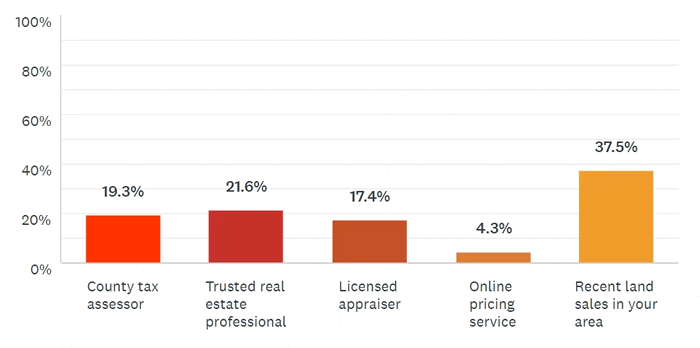Last month, the LANDTHINK Pulse posed the following question to our audience: Which would be your first source when seeking the estimated value of land you own or want to purchase?
Our informal online survey revealed that 37.5% of respondents would use the sales comparison approach as their first source for estimating the value of land they own or want to purchase. When you buy or sell land, it’s important to have an accurate estimate of the property’s value. Gauging value will help buyers avoid paying too much when purchasing land for sale and can help landowners avoid leaving money on the table if they decide to sell.
June Pulse Sponsored by
Property value is a constantly moving target. Prices are dependent on external factors, such as the overall health of the economy, social trends, as well as governmental controls/regulations and environmental conditions. In a healthy market, when supply and demand are balanced, it’s not difficult to determine land value. But when the market is out of alignment like we’re currently experiencing (inventory is low and buyer demand is high) determining value presents a challenge.
Determining the value of land in your area is a lot easier now than it was 20 years ago. There was a time the only place you could get the data needed to determine value was the MLS (multiple listing service), but today it’s possible to find public property records without the help of an agent. Specific data, covering details regarding the particular property, and general data, pertaining to the region, city, and neighborhood wherein the property is located, are collected and analyzed to nail down a value.
The sales comparison approach is commonly used in valuing both homes and land. Sometimes called the market data approach, it compares one property with recently sold properties with similar characteristics in order to determine overall value. These similar properties are referred to as comparables, and in order to provide a valid comparison, each must:
- Be as close to the present time as possible
- Be nearly identical to the subject property
- Have been sold in an open, competitive market
- Have been sold under typical market conditions
Because no two properties are exactly alike, the sales prices of the comparable properties must be adjusted up or down for each of the differences between the subject property and the comparable properties. When comparing different properties, not only must the differences in the properties be compared and accounted for, but also what property rights are being transferred or were transferred in the comparable properties, and also any differences in encumbrances must be considered. Buyers and landowners should keep in mind that the sales comparison approach might be less effective in an extremely hot market where prices are soaring.
Coming in a close second, 21.6% said a trusted real estate professional would be their first source for estimating the value of land. How does a land agent in your area determine value? There’s a lot of experience and art involved in the process. Different land brokers, with different perspectives, will likely suggest different values. The important issue for perspective buyers and landowners is to understand why a broker suggests a particular price.
A comparative market analysis (CMA) is a tool that real estate agents use to estimate the value of a specific property by evaluating similar ones that have recently sold in the same area. CMAs are generated by specialized software which can look at recent sales and properties currently on the market.
Land agents will finesse the numbers derived from the CMA with their own personal knowledge of buyer trends and market conditions. After that, they’ll reach out to their network of brokers and lenders who can usually provide them with hard numbers on currently pending sales.
As PotlatchDeltic explains, a comparative market analysis is just one tool to help determine what a fair sales price is. Unlike residential home sales, there often aren’t recent sales of comparable tracts nearby to compare a price to. By choosing to work with an experienced land broker, buyers can have confidence that the price they are paying is fair, and sellers can set the right price for their land that will drive more buyers their way.
Real estate land agents may serve as some of the best resources for estimating land value. In order to accurately make an estimation of the value of a property, you have to determine the highest and best use for the piece of land. Land agents can help determine the best use of the property by looking at the zoning in the area and by looking at surrounding properties. There can be a great deal of value in what is growing on the land, like crops or timber, as well as from what exists beneath the surface, referred to as mineral rights.
Estimating land value utilizes many of the same concepts as physical real estate valuations, but there are plenty of differences that need to be considered. Just as you would when selecting a lender to finance land, don’t be afraid to shop around for an agent that is qualified to deal in land valuations.

The results of last month’s survey showed that opinions varied on what would be the first source of information when seeking the estimated value of land. It was a mixed bag of results, but the largest percentage (37.5%) indicated that they would rely on Recent Land Sales in the Area, followed closely by 21.6%, who indicated that they would seek out a Trusted Real Estate Professional to determine land value. A large percentage (19.3%) said County Tax Assessor. Only 17.4% of respondents said Licensed Appraiser and just 4.3% said Online Pricing Service.
LANDTHINK would like to thank American Forest Management for sponsoring the June Pulse and for choosing an interesting question to pose to our audience. American Forest Management has been helping landowners manage, sell, buy, improve, and enjoy millions of acres of land for over 50 years.
Become a Pulse sponsor! It’s a great way to ensure your brokerage is the first one buyers and sellers call when they have a need to buy or sell property. You’ll get insane exposure on Social + Email + Web. That’s 500,000+ monthly eyes on you! Once you have it, you won’t want to give it up! Pulse sponsorships are offered on a first come first serve basis and are subject to certain limitations. If your business would be interested in sponsoring a Pulse question, please contact us soon.
Do you have a suggestion for next month’s Pulse question? Submit your question and we might choose yours!
We want to know what you think about our July Pulse question, chosen and sponsored by Southeastern Land Group: In what part of the U.S. would you most prefer to own rural land? Answer now.
This content may not be used or reproduced in any manner whatsoever, in part or in whole, without written permission of LANDTHINK. Use of this content without permission is a violation of federal copyright law. The articles, posts, comments, opinions and information provided by LANDTHINK are for informational and research purposes only and DOES NOT substitute or coincide with the advice of an attorney, accountant, real estate broker or any other licensed real estate professional. LANDTHINK strongly advises visitors and readers to seek their own professional guidance and advice related to buying, investing in or selling real estate.











These are great points about pricing land although I would like to point out that the only one most lenders will use on assessment of value is that of a licensed appraiser.
Good point. What does it cost to have a licensed appraisal done (% or flat fee etc).
Are Broker’s Opinions valid in the land market? If so, how are they best used?